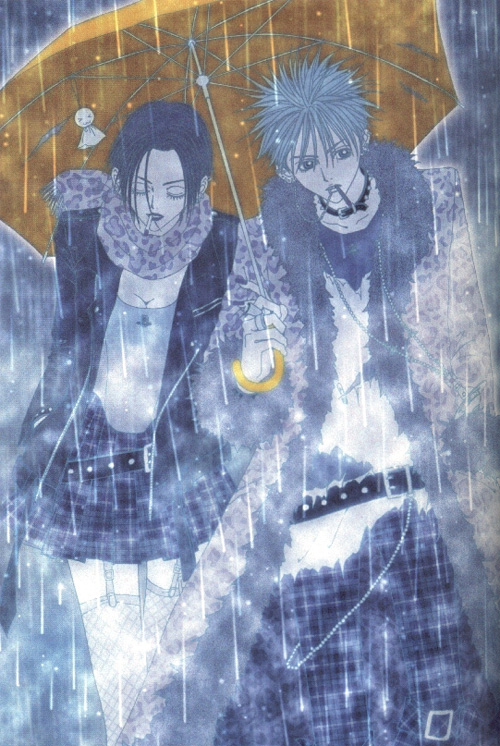One of the saddest things about NANA is that its creator Ai Yazawa (who has been fighting against an unspecified illness since 2009) hasn’t been able to finish it. NANA is a story of dreams and ambition, and the characters have struggled too hard and for too long to be left hanging. I hope Yazawa rediscovers her desire to finish it.
To put this post into context, I’ve watched up to episode 37 of the NANA anime, and since it’s a 47 episode series, there’s already a sense within me that it’s nearing the end. I don’t know if it finishes abruptly or naturally, but I do know that NANA kept going as a manga series until Yazawa’s sudden hiatus.
This is my second attempt at watching it. The first was when it began airing in 2006, but I soon lost interest. Having had a hard time sitting through Paradise Kiss, I don’t know if I felt I little jaded with Yazawa’s style of stories, but I stopped watching NANA at an early point, only to return to it recently, a little over 5 years later!

Why now? There is less anime being made now than 5 years ago, but so much of it is still of the otaku-pandering variety. It’s becoming increasingly rare to find series that aren’t about teenagers; that aren’t set in high school; that aren’t an excuse for fan service; therefore, I rediscovered NANA. I needed characters that I could relate to; adults going through the things adults do.
That’s not to say NANA is a mundane, slice of life-esque series. Most of the characters are in rival (punk-ish) rock bands, performing in front of thousands of people. There’s nothing about that side of it that I can related to, in the same way that I can’t relate to any given high school setting, but the difference lays with the character’s feelings; the desire to do something with one’s life, to find happiness, to attain perfection.
You know, Hachi…
That time when you were swept away by love…
Could it be that we felt the same way?
I wonder if you were trying to feel complete too.
If it was like that, I understand your feelings a bit.
That new life that you are trying to protect…
Does it make you feel complete?
–Nana Osaki
A desire for completeness underpins everything that happens in NANA. Characters fall in love, break up, move away and settle down, all in the pursuit of completeness. Is it enough to be in love, or is there more to one’s life? Nana Osaki is in love with her boyfriend Ren, but has ambitions of her own. She wants to sing, but that means being away from him. Nana Komatsu is so desperate for love that she finds herself committed to a relationship that she’s still unsure of. She’s always dreamed of being a happy wife, but now she’s almost there, everything feels less than… complete, and she’s trapped.
Yazawa uses her characters dreams to tear away at their lives. Nothing is perfect, she seems to be suggesting. We spend our lives striving for something, yet the closer you get to it, the further away you push everything else. Is your dream truly worth all that? Such questions are intertwined with NANA‘s spindly aesthetic and melodramatic story. There are times when I roll my eyes at how soapy and cliché it all seems, but I keep coming back for the feelings expressed, often via the narration at the end of each episode, worded in such a poetic way.
It’s snowing outside right now. It’s cold and dark, but the way the snow glows with the street lights is so pretty. I couldn’t think of a better series to watch right now than NANA.

Leave a Reply